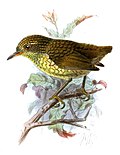| Laniisoma | |
|---|---|
 | |
| Brazilian laniisoma (Laniisoma elegans) in Bertioga, São Paulo, Brazil | |
| Scientific classification | |
| Kingdom: | Animalia |
| Phylum: | Chordata |
| Class: | Aves |
| Order: | Passeriformes |
| Family: | Tityridae |
| Subfamily: | Tityrinae |
| Genus: | Laniisoma Swainson, 1832 |
| Type species | |
| Laniisoma arcuatum [1] Swainson, 1832 | |
Laniisoma is a genus of passerine birds in the family Tityridae native to South America. The genus contains two species: [2]
| Image | Scientific name | Common name | Distribution |
|---|---|---|---|
 | Laniisoma elegans | Brazilian laniisoma | Mata Atlântica (Atlantic forest) in southeastern Brazil |
 | Laniisoma buckleyi | Andean laniisoma | Andes Mountains in Venezuela, Colombia, Ecuador, Peru and Bolivia |
